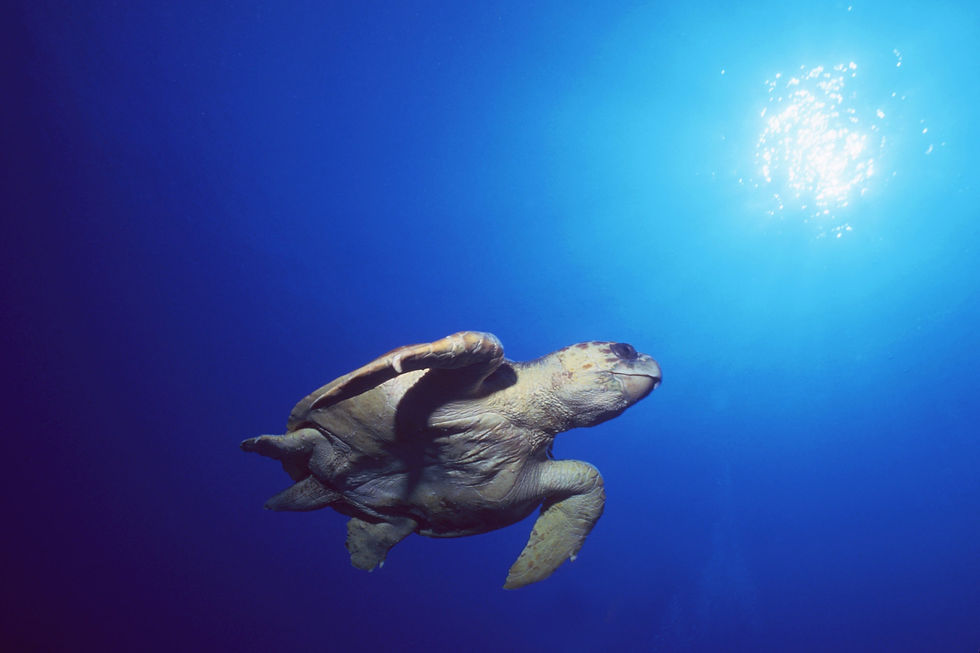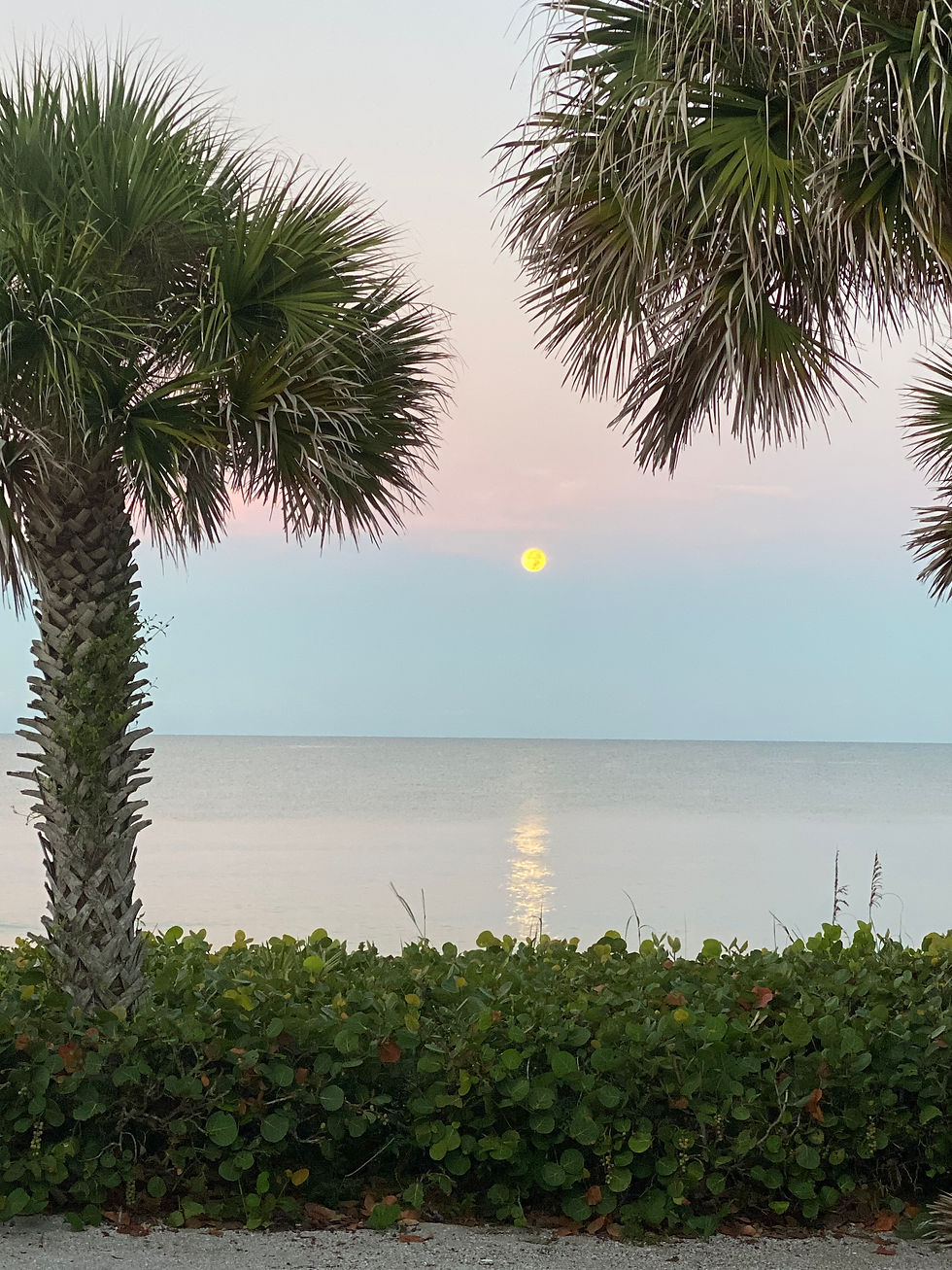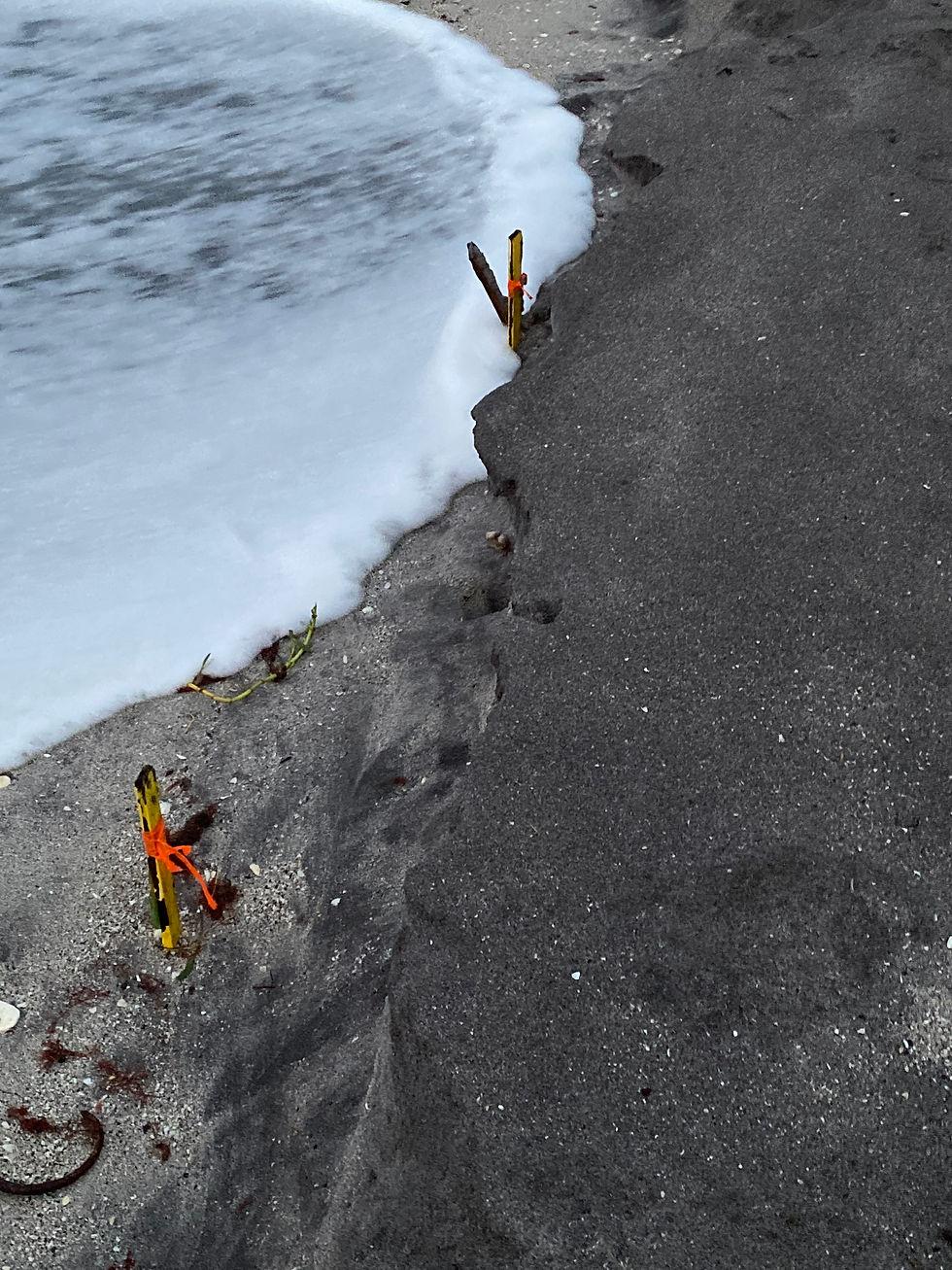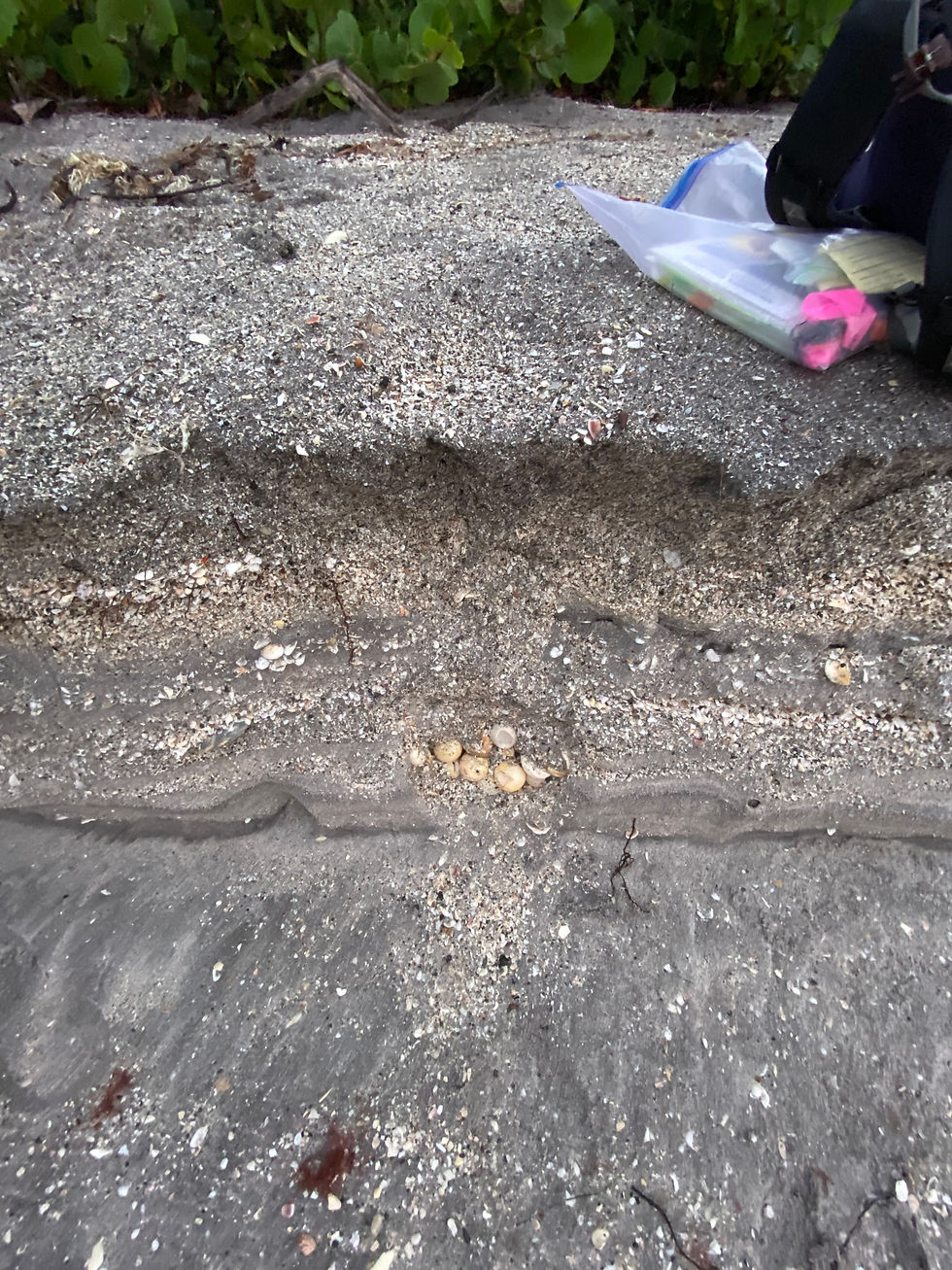Zoning Out
It's six am in late May on a narrow Gulf beach where gray is the primary color. The sun is peeping over the trees propped on the ten foot scarp to my right, signaling the heat to come. It's slow going heading north in waterlogged sandals sinking into soft sand. Way up ahead nearly a mile is an outcrop of beach which is the top of my zone and my eventual goal. On my right I've reached an enormous tree skeleton, laying on its side with bleached branches ready to scratch me or poke out my eyes. I duck down a bit to slip under one of the larger branches, noting the surf swirling up at me from my left.
“Good morning!”
I jump, with my backpack jostling and water bottle spilling. I clasp the precious turtle zone book in my arms.
“Good morning!” I reply. I focus on a figure leaning on the branch above me in the dimness. It's one of our early-bird beachcombers who rise with the tide not the sun. “Didn't see you there.”
Chuckles. “Lots of work for you today. Thirty crawls and maybe that many nests.” These tips are more than welcome, as what we're told even by casual walkers and tourists is mostly correct.
“Thanks for all your help, as usual. Here's a new pamphlet from the Wildlife Commission, with some updates for this season,” I say.
“Okay! Have a great day,” he says as he turns north and heads home. He'll easily beat me back north to the top of the zone as I have to do the official work of noting the turtle activity every few yards.
I start to follow and quickly reach a track across the sand. It heads towards the sun peeping over the scarp and ends at a nest. The flipper marks and the size of the depression tell me it's made by a loggerhead, a two hundred pound brownish-green medium-size sea turtle. I see a shallow cavity where she turned and a disturbed area that was behind her when she laid. One of her front flippers carved a slight groove in the sand wall of the scarp while she turned. There are sticks and fronds on top of the nest, which her rear flippers tossed up from the surrounding beach. Thank goodness I see no plastic trash or fishing line. I record the date, the nest number, the distance from the beginning of the zone, and the GPS coordinates. I write the number on a yellow stake along with my initials and pound it into the sand three feet in front of the nest. Going back fifty feet to the surf, I draw the shape of the crawl next to my other notes before the surf obliterates most of it. I continue north along this wrack line, the high tide mark from last night.
Intensive patrol work has been going on for at least twenty years. Nest counts are significantly increasing in the last few years, with mature turtles from initial conservation efforts are returning to native beaches. We've logged their activity, their characteristics, and their needs. We've created regulations to restrict human interference with them and their nests, requiring permits to study them, and keep beaches dark and clear of debris. We have discovered where they migrate and where some nest on formerly mysterious empty beaches.
I sip more coffee and regain focus. The tide drives me on, as some narrow stretches of beach may force me to wade back when I reach the top of the patrol zone. I come across another loggerhead track, this one a large arc forty feet across. This false crawl didn't end in a nesting, just a result of an instinct to come ashore but for some reason conditions weren't right. I record the location, and note that one flipper track is smaller than the others meaning she lost part of it in a sea encounter.
I've been working towards this kind of work, for over sixty years. But it's still a shock to transition. People are people, and these volunteers are as much characters as those at the offices I left behind. After some training and practice identifying nests, I'm suddenly here on my own today in the dim light, and I don't want it any other way. I like being on my own, contributing in my own way to a greater whole. Everyone has their own life, own retirement, and own activism. What we love is what we see of ourselves in others. Nature loving is one form of love. It's on a continuum, from single dollar donations for saving cuddly pandas to citizen science like turtle studies to GreenPeace and PETA to direct action SeaShepherds. Animals aren't ours. And we need to rectify our behavioral sins.
Most of us on patrol feel we should only interfere when we are the source of distress. Raising awareness among the tourists and residents, protecting eggs from predators we have allowed to over-populate, cleaning the environment of our own filth, and sampling and incubating eggs. But some of us disagree as to how invasive we should be, now that the turtles are thriving again, and they move on to other forms of activism. But in spite of this, we all contribute as best we can. Some are experts with the databases and the recording books, and can add value even if they can't walk the beach. Others are egg-whisperers, identifying and protecting nests in unusual places and circumstances that would otherwise be ripe for disturbance or predation.
Another hundred yards north, and I see a long crawl across a wide stretch of beach. At the apex is definitely a nest. This is our 20th nest, which in our zone requires detailed logging. In addition to what I normally record, I have to place yellow stakes in a triangle around it and measure distances to prominent landmarks, in case the nest gets flooded by surf or otherwise obscured. Then I have to hand dig a foot or two deep in the location I think the clutch of eggs is, and verify there are actually eggs there. Many times there are not. Verification makes sure there are at least that many nests accurately recorded in our database, and where we can be more certain there will be hatchlings emerging in a couple months. After digging and refilling the hole carefully, I make my recordings and move north again.
My group is mostly middle-class white retirees. It's a great role to play in your second life, learning and giving back. We're not as diverse as we should be, for several reasons, but a major one is that this group has had the benefit of a great post-war expansion and gained more security than many others. In my own case, I was tossed from the corporate world as part of a major cutback, escaping with a fraction of what I was expecting, but enough to support my volunteering. Now the future of turtle work will belong to a generation who will be getting degrees in biology and piecing together jobs in the gig economy. We have several of them as interns this season already. The changes are for the better. The new generations are meeting these challenges. My own daughter in her career has already grown beyond me, is smarter than me, communicates better in the world I'm leaving to her. I've always recognized the limits of my worldview, nature being one of many worlds I know where I have knowledge gaps. I see Okay Boomer as a great trigger. And at this dramatic inflection point, it feels like change can no longer be incremental. But many of my generation see this as a threat to themselves. We had one job, to keep our planet, but while our eyes were on shopping and social media, we almost lost it including our turtles. We all need to pitch in, and make these small sacrifices. And if you can choose your sacrifice, it's even less of a sacrifice. Abundance has allowed us to ignore nature in our lives.
Transition time is the perfect opportunity. During retirement transition, your precious previous life is erased, no one now knows who you were, you former CFO or web wiz or artist hanging in the Louvre, but now fifth in line at CVS. But it's okay because your BP is now under 100 and you're always there for dawn, sunset and the turtles.
A few more nests and I've reached the top of the zone. I close the book and head back south, under the risen sun on my left over the trees. It's a chance to think over what I've seen today, and what the future holds. What is a gut-slam of the empty nest and transition to retirement – memento mori – for humans is a gift of life we're giving back to the turtles, the chance to empty their nests and thrive again.


Moon at Dawn on turtle patrol

Hatch!

Storm

Eggs visible due to the storm
More info about Turtles and my essay
My essay is on my blog in progress: https://stonedct.wixsite.com/portraitinprose
This essay covers transition from the corporate world to that of retirement and nature.
It's a working title, that comes from the zones we divide our patrolled beaches into.
I wrote it when we moved to Florida for the NYT call for essays on Transitions. But they stopped accepting work right after I finished it. My writing group loved it and suggested I try a few other outlets, but no takers so far.
Below is a link to a great summary of our work. My essay is a companion to it, a more emotional piece
in contrast to the reporting:
You should have several free articles if you don't subscribe. If access isn't allowed, try a google to the article. Otherwise, let me know and I'll copy it for you.
Facts about our turtle work can be found here:
Comments